As part of a vision for a wilder Danube Delta, a herd of 20 kulan were translocated yesterday to the Tarutino Steppe in Ukraine. Their eventual release into the wild will enhance biodiversity, reduce wildfire risk and boost nature-based tourism.
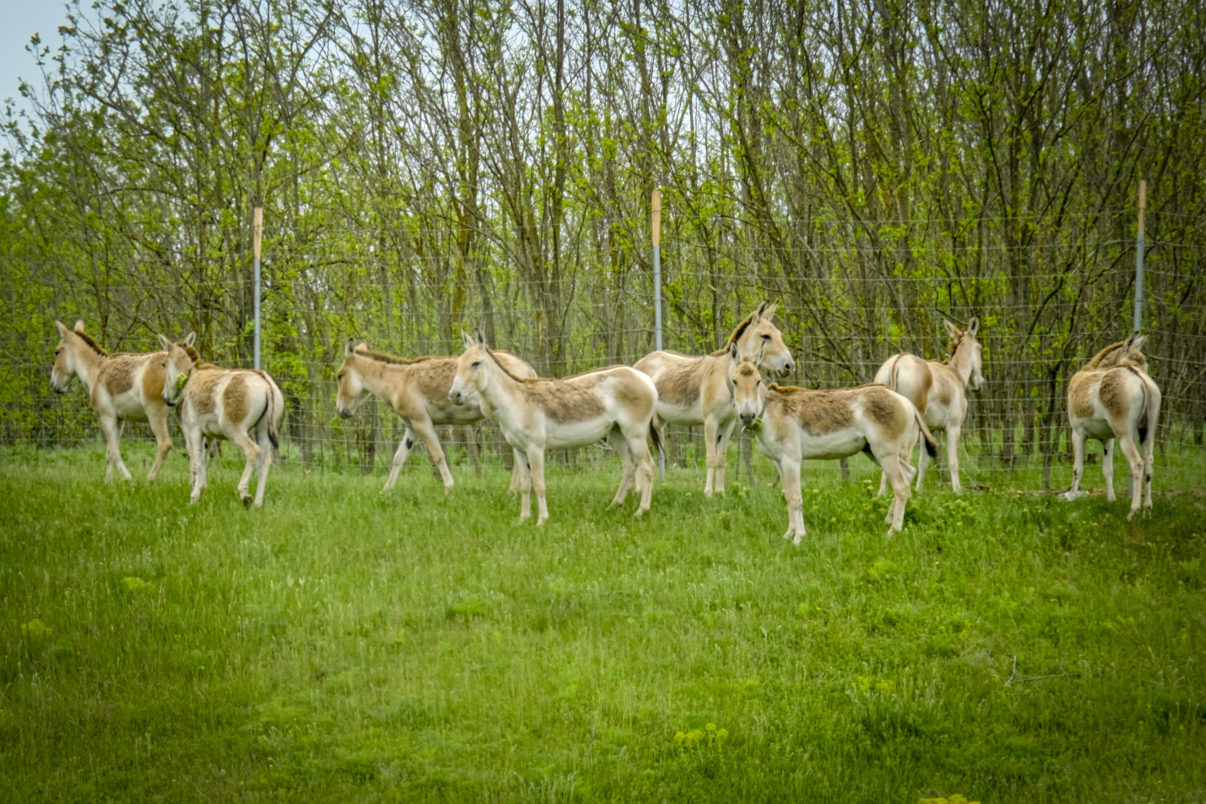
 Groundbreaking reintroduction
Groundbreaking reintroduction
Rewilding Europe and Rewilding Ukraine are thrilled to announce that a herd of 20 kulan (a wild relative of the domesticated donkey) were yesterday released into a large fenced enclosure on the Tarutino Steppe, an 8000-hectare swathe of grassland on the northern edge of the Danube Delta in Ukraine. The animals (8 males and 12 females) will eventually be allowed to roam free on the steppe later this year or early next, returning to an environment where they have been absent for hundreds of years.
A subspecies of Asiatic wild ass, the kulan (Equus hemionus kulan) once ranged across eastern Europe, the Middle East and Central Asia – from the Mediterranean to the east of Mongolia. Over the last two centuries, the impact of overhunting and habitat loss has seen their range shrink by over 95 per cent. Although the animal is doing relatively well in Mongolia, it only persists in small isolated populations in Turkmenistan, Kazakhstan and Uzbekistan. Kulan are on the IUCN Red List.
Viable population
Following a feasibility study conducted earlier this year, the kulan release is the first step of a long-term reintroduction programme, which aims to establish a viable, free-roaming herd of 250 to 300 individuals by 2035 in the Danube Delta region.
As part of a wilder vision for the steppe, the animals will fill an important ecological niche, enhancing local wild nature, reducing wildfire risk and boosting the local economy through tourism.
“This programme is really exciting because the kulan, which was once widely distributed across parts of Europe, can perform a vital natural grazing role in dry and cold environments,” says Deli Saavedra, Rewilding Europe’s Rewilding Area Coordinator.
A steppe by steppe process
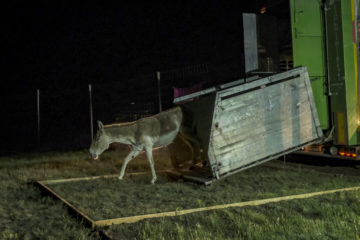
The kulan involved in the Tarutino Steppe reintroduction have been sourced from the Askania-Nova Biosphere Reserve in southern Ukraine, where a small herd was brought from Turkmenistan in 1950 (and then bred). After a quarantine period of 30 days and subsequent road journey of 550 kilometres, the animals have just been released into a 31-hectare enclosed area of steppe territory to allow them to acclimatise. They will eventually be released into the wild in the autumn of this year, or spring next year.
The kulan will be able to support themselves in the fenced enclosure, which contains a small body of water and an area of forest. Some of the animals will be tagged with GPS collars before they are released into the wild, allowing the Rewilding Ukraine team to keep track of their location and further monitor and analyse their behaviour. Although kulan are no longer of hunting interest (hunting is prohibited on the Tarutino Steppe anyway), the GPS collars also allow rangers to mitigate any potential hunting or poaching threats.
While this kulan reintroduction programme is focused on steppe habitat, Rewilding Europe hopes to continue kulan reintroductions in semi-deserts, arid mountain plateaus and other extreme European environments going forwards, in collaboration with local rewilding partners.
Enhancing wild nature
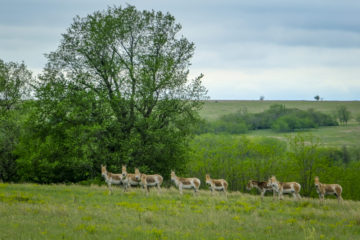
As part of the extended Danube Delta rewilding area, the Tarutino Steppe is one of the very few remaining areas of steppe in Europe. Characterised by its expansive grassy plains (like all steppe areas), it is home to many endangered species. Without human intervention, it would ordinarily be grazed by herds of wild herbivores, such as kulan, saiga antelope and deer, although these species have all disappeared, mainly due to hunting.
As the number of kulan on the Tarutino Steppe increases, so their impact on local biodiversity and food chains will grow. Their grazing will keep grass length short, benefitting animals such as souslik and steppe marmot and mitigating wildfire risk by reducing excess vegetation. Although the animals are expected to thrive in their new home, they will form an additional prey base for predators such as wolves and golden jackal, while kulan carcasses will sustain scavengers such as vultures and foxes.
Natural adaptation
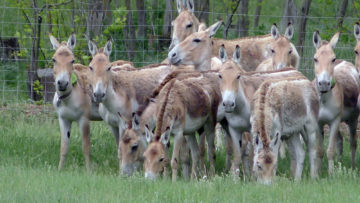
Incredibly hardy, kulan are well-adapted to their environment. As one of the fastest mammals on the planet, they can reach speeds of up to 70 kilometres per hour. Kulan are also social creatures, forming well-structured herds – this helps the animals defend themselves against predators.
On the Tarutino Steppe, the free-roaming kulan may encounter wolves, golden jackal and stray dogs, although wolves are thought to prey primarily on very young, old or sick kulan. In the event that the newly released animals suffer from heavy predation, guard dogs may be deployed as a temporary measure until they are better able to defend themselves.
Part of the process
All kulan releases are carried out by the Rewilding Ukraine team and Askania-Nova Biosphere Reserve. They are part of scaled-up rewilding efforts in the Danube Delta rewilding area, which began at the start of 2019 with funding provided by the Endangered Landscapes Programme (ELP).
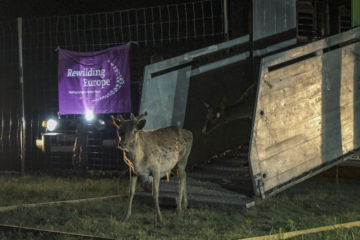
The 31-hectare enclosure into which the kulan were released was constructed as part of a large-scale development project carried out by the Odessa regional government, Odessa-based Centre for Regional Studies and “Borodino-A” company. More herbivores – saiga antelope, Ukrainian Grey cattle and kulan – will be released onto the Tarutino Steppe in the autumn of 2020 under the framework of this complementary project.
Local communities will increasingly benefit from the ongoing enhancement of wild nature on the Tarutino Steppe. Rewilding Ukraine is now cooperating with local communities and a local business partner (Frumushika Nova) to develop nature-based tourism. There are also plans to hold an “ethno-eco” festival in Tarutino as part of the ELP programme, although these have been temporarily put on hold due to the Covid-19 pandemic.
Want to know more?
- Rewilding Europe’s work in the Danube Delta
- Rewilding Ukraine Facebook page
- Rewilding Danube Delta Facebook page
- Endangered Landscapes Programme
- More on kulan
